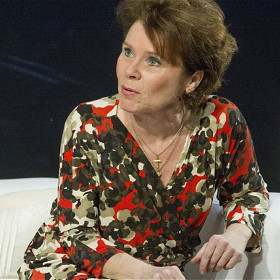Good People (Hampstead Theatre)
David Lindsay-Abaire’s Tony-winning play receives its UK premiere starring Imelda Staunton

© Alastair Muir
The unmistakeable silence of a really good new play taking its hold on an audience descends on Hampstead Theatre as Margie (Imelda Staunton), a single mother who’s just been fired, seeks out an old boyfriend, Mike (Lloyd Owen), who’s gone up in the world.
David Lindsay-Abaire’s Good People was seen in New York three years ago and won Frances McDormand a best actress Tony; it’s a rare beast, a contemporary American play about class – "Who’s Upton Sinclair?" somebody asks – and Staunton seizes on the role of an unlucky social outcast with a ferocity that’s almost frightening.
Reunited with her Sweeney Todd director, Jonathan Kent, she combines the audacious fire of Mrs Lovett with the deep-buried sense of hurt and decency of her Vera Drake for Mike Leigh. Margie has a physically disadvantaged daughter, Joyce, whom we never see, and whose paternity becomes an issue when she visits Mike and is mistaken at first by his young black wife, Kate (brilliant newcomer Angela Coulby), for a caterer.
The set-up is stark and simple: we see Margie losing her job as a cashier in a dollar store (the South Boston equivalent of a pound shop), visiting Mike in his office to seek help and wangling an invitation to his birthday party on Chestnut Hill in the suburbs. The party is cancelled but Margie goes anyway, assuming Mike doesn’t want her mixing with his new class of friends.
This segues into a three-cornered, bristling conversation piece about roots, racism, Mike’s background of violence with a suggestion that his marriage to an African American is some sort of guilty reparation, and social mobility in a particular neighbourhood.
That "Southie" area is deliciously caught in the riotous performances of June Watson and Lorraine Ashbourne as two of Margie’s friends in scenes that book-end the show-down. And there’s also young Stevie (Matthew Barker), the boss of the dollar store on a lucky winning streak in the bingo parlour, a dodgy but innocent character with the saving grace of not being a class traitor.
The flavour of Lindsay-Abaire’s writing – he’s the author of Fuddy Meers, the movie Rabbit Hole starring Nicole Kidman and the book and lyrics of Shrek the Musical – offsets the slight sense of rigged argument, but that’s more the play’s structure doing the writer’s deeply felt work, and Kent’s production is not only very well cast but also outstandingly well-acted.
The sleek lines and muted colours of Hildegard Bechtler‘s revolving design play their part, and the sonorous shiftiness of Lloyd Owen‘s performance is another indicator of the play’s territory, as he counter-punches Margie’s onslaught, mainly below the belt. There’s a savage twist at the end, too, on a night when Staunton takes a deserved solo bow for a performance that should draw the town and keep her busy until she takes on another barnstormer, Mama Rose in Gypsy in October.














